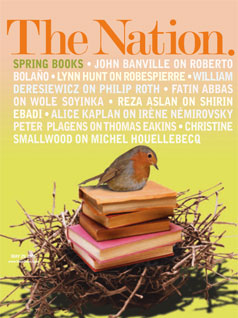Print Magazine
May 29, 2006 Issue
Patricia J. Williams addresses the flap over "The Star Spangled Banner," Peter Plagens considers painter Thomas Eakins, Daphne Evi…
Cover art by: Cover design by Gene Case & Stephen Kling/Avenging Angels
Purchase Current Issue
or
Login to Download the PDF of this Issue Download the PDF of this Issue
Editorial
'TAINT FUNNY, COLBERT
The Editors
Bolivian President Evo Morales is taking a risk in nationalizing his country's natural gas fields--but it reflects growing discontent across Latin America over unfair deals with ba...
Daphne Eviatar
After years of vacillation, John Kerry has gone bold, finding his voice on Iraq and national security and thinking hard about running for President. But his future cannot be separa...
Ari Berman
There is no piecemeal solution to the gas price crisis. It's a systemic sickness that goes to the root of the American way of life: big cars, big oil, big business and sprawl.
The Editors
The CIA is in need of reinvention and a director who can oversee the transformation. Gen. Michael Hayden is not the right man for the job.
The Editors
Column
Bush has taken a sensible stance on immigration, but his plummeting credibility will prevent people from embracing his proposals.
Robert Scheer
Soccer fans in Germany struck a blow against US corporate blandness by turning up their noses at the notion that Budweiser is the official beer of the games.
Nicholas von Hoffman
In praise of three giants of American liberalism: John Kenneth Galbraith, Rabbi Arthur Hertzberg and the Rev. William Sloane Coffin Jr.
Eric Alterman
Why is it that We the People are so obsessed with whether singing our national anthem in Spanish is an affront to our union?
Patricia J. Williams
Feature
Tens of thousands of Hurricane Katrina victims remain without homes. The
environment is devastated. People are disenfranchised. Financial
resources, desperate residents are ...
Jeremy Scahill
The relentless reduction of taxes on the wealthy has created a profound inequality between the very rich and the bottom half of American society, affecting every aspect of daily li...
Leon Friedman
As centrist Democrats slowly but surely unite around a plan for military withdrawal from Iraq that is heavy with hawkish reasoning, what are the implications for the peace movement...
Tom Hayden
If you can lie about science and get away with it, you can lie about anything. That's why we must say no to ideological zealots who are waging war against science and against democ...
Patricia Princehouse
To World Cup aficionados, soccer is a beautiful game, but to ideologues in the United States and Europe, it's a convenient political weapon against Iran's nuclear ambitions. Talk a...
Dave Zirin and John Cox
The crankily contrarian Neil Young has a knack for making music that reflects the times. Living With War, his blistering attack on the Bush presidency, marks the turning of ...
Kevin McCarthy
Books & the Arts
The crankily contrarian Neil Young has a knack for making music that reflects the times. Living With War, his blistering attack on the Bush presidency, marks the turning of ...
Kevin McCarthy
Iran Awakening is the memoir of Shirin Ebadi, who was awarded the Nobel Peace Prize for her struggle to hold Iran's clerical regime accountable for its gross human rights vi...
Reza Aslan
In Absent Minds: Intellectuals in Britain, Stefan Collini encapsulates the paradoxes that dominate discussion of the English cultural landscape.
Richard Vinen
Michel Houellebecq's The Possibility of an Island has at last landed on American shores, along with Pierre Mérot's Mammals.
Christine Smallwood
Wole Soyinka's You Must Set Forth at Dawn is a captivating memoir of the political and cultural dilemmas the author and activist encountered, and a compelling chronicle of N...
Fatin Abbas
Satirist Alan Bennett's Untold Stories is a packed suitcase of a book by one of Britain's finest writers, exploring the ra
David Thomson
In The Seduction of Culture in German History, Wolf Lepenies reflects on shifting manifestations of German philosophy and culture and considers the lessons they offer for Eu...
Andreas Huyssen
Two biographies of Thomas Eakins reveal the art world's attitudes about the painter's bodily obsessions: Was he a curious innocent, a brilliant anatomist or a dirty old man?
Peter Plagens
Two new books on the French Revolution examine Robespierre's role in advocating terror as an instrument of government, raising compelling questions about state-sponsored terror in ...
Lynn Hunt
In Stravinsky, the Second Exile, Stephen Walsh chronicles the composer's late years, disentangling the realities of his life and work from the published assertions of a self...
Paul Mitchinson
Irène Némirovsky's Suite Française, published fifty-two years after she perished at Auschwitz, offers an unsparing critique of France under the German o...
Alice Kaplan
Philip Roth's Everyman is a contemporary morality play that explores the author's obsessions with health and virility, ecstasy and betrayal, and the certainty and solitude o...
William Deresiewicz
New translations of novels by exiled authors Roberto Bolaño and Ismail Kadare explore the bloody crossroads where literature, politics and self-absorption converge.
John Banville
Why is it that We the People are so obsessed with whether singing our national anthem in Spanish is an affront to our union?
Patricia J. Williams
Recent Issues
See All
"swipe left below to view more recent issues"Swipe →
See All
